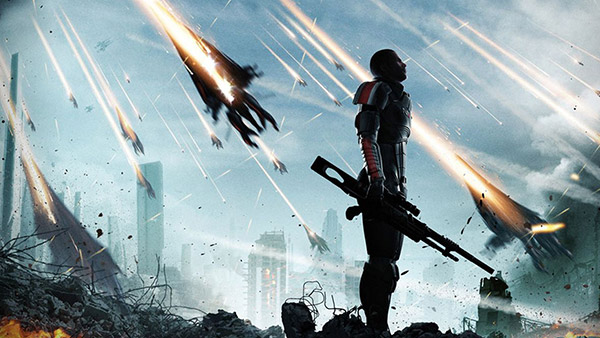Watch Mass Effect 3's developers look back on the controversial, crunch-generating ending
It's been almost a decade since the controversial ending of Mass Effect 3. Its developers are still feeling the impact.

The folks at People Make Games have an excellent look back at the cultural moment that was the release of Mass Effect 3. Or more specifically--the reaction to Mass Effect 3's ending, and what it did to the game's developers.
For the unfamiliar (or those in need of brain-jogging), Mass Effect 3 concluded BioWare's space opera trilogy with an explosive story whose last minutes whittled down into a series of three choices. Those choices triggered three different cutscenes that didn't fully explain the end of the series' story, and were only slight variations on one another with re-used cinematic assets.
It was supposed to be BioWare's big triumphant moment, and it quickly turned into something darker and more frustrating.
Whatever you think about the game's ending, there's no denying the original controversial sequence wasn't one decision--it was an end result of dozens of developers trying to wrangle the finale of a massive series, which also needed to be made on top of a game with its own massive story. People Make Games host Chris Bratt spoke with some of those developers to revisit how the ending happened--and the emotional damage of the aftermath.
Bratt's full 30 minute video is a great beginning-to-end recap of the controversy, with some fresh facts about what happened in the following days. There are two clear takeaways for the modern game development audience: First, even the people who worked on the ending have conflicted feelings about it, and two, BioWare management's handling of the situation led to an extended period of crunch that damaged the people who made Mass Effect 3 possible.
Some of the developers interviewed include writer Chris Hepler, gameplay designer and Brass Lion Games co-founder Manveer Heir, animation director Dave Wilkinson and more. Wilkinson shared that the "three colors" variants of the ending seemed to be extrapolations of early storyboards he'd done, where he used different colors to indicate moral choices that aligned with Mass Effect's blue/red Paragon/Renegade system.
(The "green" color was meant to represent a third path tied to a seemingly cut "Reaper Queen" who was replaced by a computer ghost child in the final game.)
For any developer who's watched a half-thought idea go from storyboard all the way to ship, it's a dreadfully familiar moment that triggered what came next--the furious fan backlash and campaign.
Fan response to the ending ranged from satisfied, to disappointed but polite, to outright hatred. One group of snarky fans infamously sent BioWare cupcakes with green, blue, and red frosting--that all were the same vanilla flavor.
"I'm so fucking pissed off about the cupcakes," cinematic designer Zachariach Scott groaned. "We didn't even get to eat them!"
The cupcakes were donated and denied to developers--apparently one senior designer said they'd "taste like sarcasm." But the cupcakes were an ill omen for BioWare's developers, who knew something bad was building.
"There's an aspect of the cupcake thing where it's like, the real world," said former system programmer Mark Jaskiewicz. "Now you've got people sending things to the place you go to work to every day."
And what followed the cupcakes was worse. Anger, death threats, and constant criticism in a "Reclaim Mass Effect" campaign. That all led the studio's co-founders, Drs. Greg Zeschuk and Ray Muzyka, to promise an "Extended Cut" that would ship less than four months after the game's debut.
Not only was it another three-month crunch imposed on BioWare's developers, some like Heir understood that giving in to fan outrage could have huge consequences. Some developers were excited to update the ending, others, like Heir, worried that they were opening Pandora's Box.
Scott noted that within "two years" of Mass Effect 3's debut, "everyone was fried." Some of that was the beginning of a brutal development cycle for Dragon Age: Inquisition, but a prolonged crunch period and intense, sometimes hateful fan feedback, had left a harsh mark on the development team.
Bratt's full video captures more comments from other developers, and shows how divided individual staffers were about every decision made from the original ending to the extended cut. You can watch it below:
About the Author(s)
You May Also Like







.jpeg?width=700&auto=webp&quality=80&disable=upscale)








